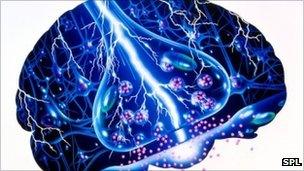Epilepsy rises 38% in Scotland, BBC investigation shows
- Published

Better reporting is said to have contributed to the rise in the number of people with epilepsy
The number of people with epilepsy in Scotland has increased by almost 40% in just six years, according to new figures.
A BBC Scotland investigation found there were now about 54,000 people living with the condition.
The Joint Epilepsy Council (JEC), which did the research, said it highlighted the need for more specialist provision.
It is thought better reporting of problems and an ageing population could have contributed to the dramatic rise.
The new figure is up 38% since 2005 when the number of people with epilepsy in Scotland was recorded as 39,000.
The JEC found that across the UK, the number of people living with the condition had grown 32%, from 456,000 in 2005 to 602,000 this year.
Specialist nurses
Sharon Wood, JEC chief executive, said a "combination" of factors explained the rise but that improved record keeping was the main reason.
She said Sign, the Scottish Intercollegiate Guidelines Network, which develops evidence-based clinical practice guidelines for the NHS in Scotland, had improved diagnoses.
She added: "I think record keeping has just been very, very bad. There is much better attention to recording now as a result of Sign clinical guidelines.
"Also, we have a greater ageing population, and older people have unfortunately a higher incidence of epilepsy. And of course, we have a general population increase to take into account."
Campaigners said provision was not keeping pace with the rise in numbers and treatment depends very much on where you live.
Only five health boards out of 14 currently have a consultant who specialises in epilepsy.
Lesslie Young, of Epilepsy Scotland, said the increase in the number of people living with the condition emphasised the need for more specialist help.
"We have half the number of specialist nurses that we'd want to have, to cover the population," she told the BBC investigation.
"That's not enough. Equally we have 15 specialists, across five health boards in the central belt, we'd like to see one in every area.
"If the increase continues at the present rate we'll be looking at an epidemic of epilepsy. We need to focus on what we need now so we can meet the needs of that population."
More progress
Minister for Public Health Michael Matheson told BBC Scotland that while there were gaps in service at present the government was trying to make sure health boards are working in a more consistent way.
He added: "What I don't accept is that we're in a situation where people who may have epilepsy are just not receiving an adequate service full stop. I think there'll be a lot of good clinical practice out there.
"We've made further progress in the range of services available to support them across our health boards in Scotland.
"But I do accept there is clearly more progress that needs to be made in this area and we've put in place a range of measures in order to do that."
The investigation also revealed that experts believe the lack of provision for people with epilepsy could lead to misdiagnosis and unnecessary medicines being prescribed.
The figures from the JEC suggested that the cost of misdiagnosis of epilepsy in Scotland has risen by £10m in the past six years.
The Investigation, Epilepsy in Scotland will be broadcast on at 10:30 on Sunday 27 November.
- Published14 October 2011
- Published25 August 2011
- Published7 June 2011